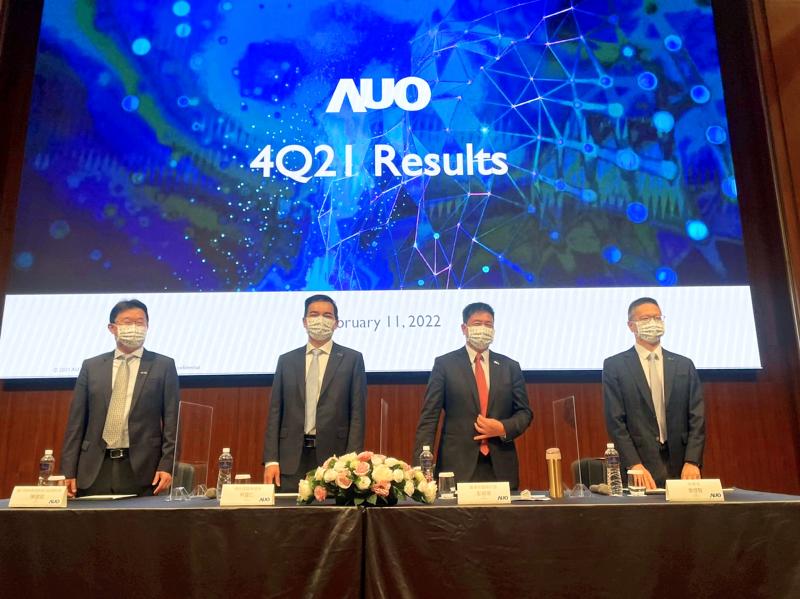AU Optronics Corp (AUO, 友達光電) is planning to build an advanced flat-panel plant in Taichung, aiming for commercial production by 2025, the Hsinchu-based company said on Friday, as it reported a record net profit for last year, driven by strong global demand.
AUO chief financial officer Benjamin Tseng (曾煜智) told an investors’ conference that the company’s board had approved increasing its capital expenditure budget by NT$28 billion (US$1.01 billion) this year, part of which would be allocated to the construction of the new plant.
AUO expects an overall capital expenditure of NT$45 billion this year, Tseng said.

Photo: Chen Mei-ying, Taipei Times
AUO chairman Paul Peng (彭双浪) said the company would spend more next year to install the plant’s equipment and prepare for its commercial operations by 2025.
The new plant would be in the Central Taiwan Science Park (中部科學園區) in Taichung’s Houli District (后里), Peng said.
AUO president and chief operating officer Frank Ko (柯富仁) said the plant would be a smart production site for advanced 8.5th and perhaps 8.6th-generation flat screens, as part of AUO’s efforts to set up micro-LED display production.
The company is weighing whether to use amorphous silicon technology or low-temperature polysilicon technology on the plant’s production lines, Ko said.
AUO reported a record NT$61.33 billion in net profit for last year, up 1,716.5 percent from a year earlier, with earnings per share of NT$6.44, compared with NT$0.36 in 2020.
Its consolidated sales rose 36.8 percent year-on-year to NT$370.69 billion last year, the company said.
AUO said it benefited from a booming global stay-at-home economy in the first half of last year, amid the COVID-19 pandemic.
In the second half, when many countries eased movement restrictions, business activity increased, driving demand for products in the business sector, it added.
Gross margin grew to 24.5 percent, compared with 8.4 percent in 2020, AUO said.
Screen shipments rose 0.6 percent from a year earlier to 25.72 million square meters last year, the company said.
Peng said shipments of large screens dropped sharply in the second half of last year, but the decline has been showing signs of moderating, while inventory levels have reached healthy levels.
So far this year, inflationary pressure has pushed up raw material prices, creating uncertainty in the flat-panel industry, he said.
With the global electric vehicle market gaining momentum, business opportunities are growing in the industry, which might offset the weakness of the TV panel market, Peng said.

CHIP RACE: Three years of overbroad export controls drove foreign competitors to pursue their own AI chips, and ‘cost US taxpayers billions of dollars,’ Nvidia said China has figured out the US strategy for allowing it to buy Nvidia Corp’s H200s and is rejecting the artificial intelligence (AI) chip in favor of domestically developed semiconductors, White House AI adviser David Sacks said, citing news reports. US President Donald Trump on Monday said that he would allow shipments of Nvidia’s H200 chips to China, part of an administration effort backed by Sacks to challenge Chinese tech champions such as Huawei Technologies Co (華為) by bringing US competition to their home market. On Friday, Sacks signaled that he was uncertain about whether that approach would work. “They’re rejecting our chips,” Sacks

NATIONAL SECURITY: Intel’s testing of ACM tools despite US government control ‘highlights egregious gaps in US technology protection policies,’ a former official said Chipmaker Intel Corp has tested chipmaking tools this year from a toolmaker with deep roots in China and two overseas units that were targeted by US sanctions, according to two sources with direct knowledge of the matter. Intel, which fended off calls for its CEO’s resignation from US President Donald Trump in August over his alleged ties to China, got the tools from ACM Research Inc, a Fremont, California-based producer of chipmaking equipment. Two of ACM’s units, based in Shanghai and South Korea, were among a number of firms barred last year from receiving US technology over claims they have

It is challenging to build infrastructure in much of Europe. Constrained budgets and polarized politics tend to undermine long-term projects, forcing officials to react to emergencies rather than plan for the future. Not in Austria. Today, the country is to officially open its Koralmbahn tunnel, the 5.9 billion euro (US$6.9 billion) centerpiece of a groundbreaking new railway that will eventually run from Poland’s Baltic coast to the Adriatic Sea, transforming travel within Austria and positioning the Alpine nation at the forefront of logistics in Europe. “It is Austria’s biggest socio-economic experiment in over a century,” said Eric Kirschner, an economist at Graz-based Joanneum

OPTION: Uber said it could provide higher pay for batch trips, if incentives for batching is not removed entirely, as the latter would force it to pass on the costs to consumers Uber Technologies Inc yesterday warned that proposed restrictions on batching orders and minimum wages could prompt a NT$20 delivery fee increase in Taiwan, as lower efficiency would drive up costs. Uber CEO Dara Khosrowshahi made the remarks yesterday during his visit to Taiwan. He is on a multileg trip to the region, which includes stops in South Korea and Japan. His visit coincided the release last month of the Ministry of Labor’s draft bill on the delivery sector, which aims to safeguard delivery workers’ rights and improve their welfare. The ministry set the minimum pay for local food delivery drivers at